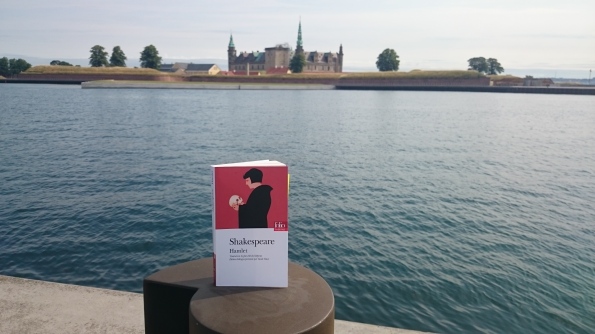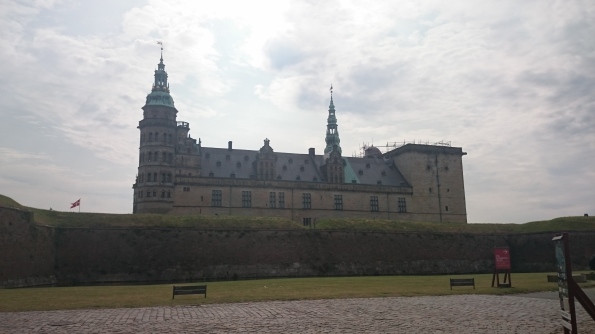Archive
Literary escapade: Verona
I swear I’m not trying to visit all the locations Shakespeare used in his play but after Elsinore, I’ve had the chance to visit Verona. Shakespeare never set a foot in Verona but, as everyone knows, made the city famous with Romeo and Juliet. I’m not going to review Romeo and Juliet, I haven’t even reread it, it’s not my favourite play by Shakespeare. Too much teenage drama.
The city of Verona, like Elsinore with Hamlet, takes advantage of the ultra-famous lovers. Shakespeare has several statues in the city and they puzzled our children because he wears an earring (“Mom, do you really think Shakespeare had an earring?”).
I checked afterwards, not all of Shakespeare’s alleged portraits show an earring. Anyway.
Somewhere in the old city center, there’s Juliet’s house with the famous balcony. It can’t be hers, of course, but it always gives you a sense of place. There are a lot of tourists under her balcony
I didn’t see any Juliet impersonation saying O Romeo, Romeo, wherefore art thou Romeo? from the said balcony. Inside the house, they’ve recreated Juliet’s home, see what her bed is supposed to have been:
Of course, there are lots of love-related gift shops around the place and two walls of graffiti of “X loves Y”. Seems like the way to a man’s heart is his stomach, even for a modern Juliet:
Do I need to say what my feminist self thinks of this?
Near the river Adige, there’s via Shakespeare, lungadige Capuleti and Juliet’s supposed grave.
Marketing and imagination do marvels. It’s like a bookworm version of Disney when you see the Sleeping Beauty’s castle. It’s unauthentic as possible but still fun to do.
The real literary thing about Verona is Dante’s statue.
The great author was exiled in Verona and mentioned the city in The Divide Comedy.
Literary escapade: Elsinore
I have seen Hamlet on stage once. It was a modern version where Hamlet ended up naked while Rage Against the Machine was blearing to get you in the mood, I guess. Teenagers had come with their teachers and were giggling at the nakedness. I can’t say it’s my best experience in a theatre. I’m French, so I’ve never studied Shakespeare in school, I discovered his plays by myself afterwards. This probably explains why I thought Elsinore was as real as the Sleeping Beauty’s castle. I assumed that Shakespeare had invented a place, outside of his own country, to be sure not to offend his queen with his plays. Imagine my surprise when I realized that Elsinor actually existed and was a mere thirty minutes away from Copenhagen where I was headed for a long weekend.
So I bought a bilingual edition of Hamlet, brought it with me to Denmark and started to read the play on the way to Elsinore. I love those bilingual editions by Folio. On the left page, you’ve got the original text and on the right page, you have the French translation. You can follow the text line by line, it’s very useful and relaxing as you can switch to French when Shakespearian English becomes too difficult.
I am not going to review Hamlet. Really, what could I say that has not been said?
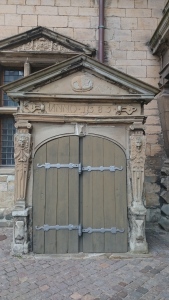 Let’s talk about Kronborg castle in Helsingør (Elsinore in Danish). Kronborg castle was improved by King Frederic II at the end of the 16th century. In 1629, a fire destroyed part of the castle and King Christian IV had it renovated. What we see today in the castle mostly pictures King Christian IV’s times. This means it didn’t exist in Shakespeare’s times but older parts are preserved, like the door on this picture.
Let’s talk about Kronborg castle in Helsingør (Elsinore in Danish). Kronborg castle was improved by King Frederic II at the end of the 16th century. In 1629, a fire destroyed part of the castle and King Christian IV had it renovated. What we see today in the castle mostly pictures King Christian IV’s times. This means it didn’t exist in Shakespeare’s times but older parts are preserved, like the door on this picture.
I understand that Hamlet comes from a Danish old legend, reported by the French writer François de Belleforest in his book Histoires prodigieuses in 1582. Then Thomas Kyd made a play out of Belleforest’s tale and it gave Shakspeare the idea to write Hamlet. This explains why it’s set in Denmark and Kronborg was, in Shakespeare’s times, where the King of Denmark used to live. It is established that Shakespeare never set a foot in Elsinore but Shakespeare has his sculpture engraved in the castle’s wall anyway. And the marketing team at Kronborg castle plays the Shakespeare card as much as possible. They organise Shakesperian tours on the premises.
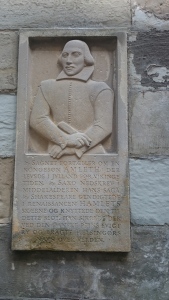
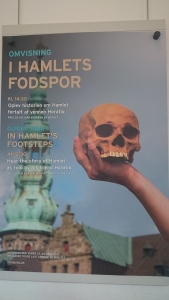 As for me, I like to imagine that Shakespeare had at least seen paintings or drawings of Elsinore or that he had read about it. Here’s the terrace where Hamlet is supposed to have met with his father’s ghost.
As for me, I like to imagine that Shakespeare had at least seen paintings or drawings of Elsinore or that he had read about it. Here’s the terrace where Hamlet is supposed to have met with his father’s ghost.
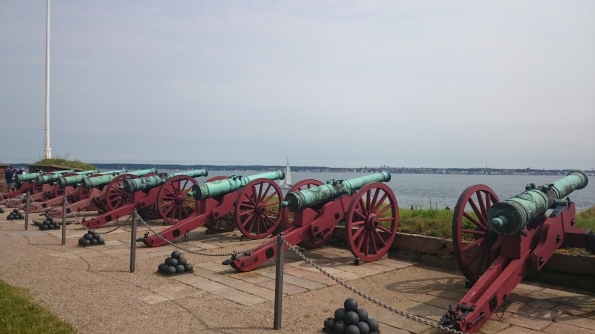 And here’s a general view of the castle. Even if Shakespeare never went to Elsinore, it’s still a nice visit to do and a great opportunity to read Hamlet.
And here’s a general view of the castle. Even if Shakespeare never went to Elsinore, it’s still a nice visit to do and a great opportunity to read Hamlet.
Merdre or Shrit! Ubu Roi is a lot more sensible than expected
Ubu Roi by Alfred Jarry. 1896. Written circa 1888. English Title: Ubu Rex.
I’m going to watch the play Ubu Enchaîné (Ubu Bound) by Alfred Jarry in a couple of days. So I thought I might as well read it before watching it. Then I realized that Ubu Roi and Ubu Cocu (Ubu Cuckolded) came before Ubu Enchaîné, and that there was also Ubu sur la butte (1906) I downloaded the four plays, so you can expect more about Ubu.
In Ubu Roi, Père Ubu and Mère Ubu murder the current king of Poland so that Père Ubu can be powerful and rich. Follow the inevitable massacres of opponents, wars, spoliations and battles.
In French, ubuesque means totally absurd. Hmm, I’m not sure about Ubu being totally absurd. It is a parody of classic theatre, Shakespeare, Corneille and Racine in particular. It’s clear in the introduction:
| Adonc le Père Ubu hoscha la poire, dont fut depuis nommé par les Anglois Shakespeare, et avez de lui sous ce nom maintes belles tragœdies par escript. |
Thereatte Lord Ubu shooke his peare-head, whence he is by the Englysshe yclept Shakespeare, and you have from him under thatte name many goodlie tragedies in his own hande. translated by C. Connolly and S. Watson Taylor. |
And indeed, Ubu is a funny pot-pourri of the conventions of tragedy and of allusions to the history of France. In the first scene, Mère Ubu talks Père Ubu into killing the king of Poland to dethrone him then become rich. There are already several allusions in that scene. The most obvious one is the reference to Macbeth, especially since Ubu kills the king just after he rewarded him for his courage at war. The second one would be a historical reference to the 16thC, when Henri II, son of Catherine de Médicis became king of Poland.
Later, during the war, Ubu loses his horse. Although he’s not ready to give up his kingdom for a horse, he’s pretty upset by the loss. Ubu also wants to kill his assailants by sticking a wood pick in their ears, which reminded me of Hamlet’s father being killed with poison in his ear. By the way, after the war, Ubu sails near Elsinore on his way back to France.
Other allusions to Shakespeare are scattered throughout the text: Family Ghosts talk to Bougrelas, the son of the former king, during his sleep. He’s on the run, thinking about revenge.
| O mon Dieu ! Qu’il est triste de se voir seul à quatorze ans avec une vengeance terrible à poursuivre ! | O my God! How sad it is to be alone at fourteen with a terrible vengeance to pursue |
The Ghosts give him a sword that won’t rest in peace until the usurper is dethroned. The idea of vengeance at any cost is also present in Le Cid by Corneille, which takes place in Spain and there are allusions to Spain in Ubu Roi too. One sentence is an open reference to Horace, also by Corneille:
| Combat des voraces contre les coriaces, mais les voraces ont complètement mangé et dévoré les coriaces, comme vous le verrez quand il fera jour | Fight of the voracious against the tough but the voracious totally ate and devoured the tough, as you’ll see it when it is dawn. |
Here you need to read the French. Horace relates the fight between the Horatii (Horaces) and the Curatii (Curiaces), an episode of Ancient Rome history. In Jarry’s phrase, Horace becomes vorace (voracious) and Curiace becomes coriace (tough).
Jarry plays with the conventions of theatre. Somewhere in the play, Mère Ubu has her monologue, a tradition in classic plays. I also caught allusions to Molière: Ubu’s passion for money reminded me of L’Avare. Some devices come from Molière and the Comedia dell’Arte: streams of insults, tricks, beat-ups. Sometime, Ubu is convinced that he saved his crowd from a bear thanks to a prayer. What a Tartuffe!
Several episodes of our history are mentioned in the play. After ridiculous trials, Ubu executes the nobility of his country to take their properties. It’s not the guillotine, but it’s close; I thought of the Terror. Ubu visits the previous king’s son in his jail and says it would make a fuss of he escaped. I saw a mix between Louis XVII in the prison du Temple after the Revolution and their attempt to flee the country. Later, Ubu is stuck in Russia, in the snow, during a war with his enemies. Doesn’t that ring a bell?
I suspect that there were also allusions to contemporary politics. Ubu wants to create all kinds of taxes, and taxes on propriety and on revenues were actually discussed during the Third Republic in France. I also find strange that a peasant is named Stanislas Leczinski, which is the name of the last Duke of Lorraine, just at a time when reconquering Lorraine to the Germans was a major issue in the country.
In a way, I even found Jarry premonitory. Ubu calls himself Maître des Financiers (Master of Finance Men), he sees his political role as a taking good care of the finance. With the Euro crisis these days, I wonder if our politicians don’t feel the same.
That was the substance. Now the form. The language is extraordinary, literally. It’s full of play-on-words, allusions, slang, swear words and inventions. I’m not surprised his contemporaries were shocked. It mixes old French with argot, accents and onomatopoeias. It’s funny, terribly funny and very witty, like here:
| Pile.— Hon ! Monsieuye Ubu, êtes-vous remis de votre terreur et de votre fuite ? Père Ubu.— Oui! Je n’ai plus peur, mais j’ai encore la fuite. | Pile – Hon! Sir Ubu, have you recovered from your fright and your flight?
Père Ubu: Yes! I’m not frightened any more but I’m still flightened. |
I couldn’t find a free translation online, so you’ll have to bear my translations. Be forgiving, it’s not easy to translate. The dialogues are totally whacked, surrealist we would say now. (and indeed Jarry was a precursor of the Surrealists)
| Un Capitaine (arrivant).
— Sire Ubu, les Russes attaquent. Père Ubu. — Eh bien, après, que veux tu que j’y fasse ? Ce n’est pas moi qui le leur ai dit. |
A Captain, coming.
– Sir Ubu, the Russian attack. – Well, what do you want from me? I’m not the one who asked them to. |
Sometimes, it’s also very sharp. Before Ubu, the finance men are spelled Les Financiers. After the coup, they are spelled Phynanciers, a way to show that after a revolution, the people remain but with another tag.
I had a lot of fun reading this. Under the apparent craziness, I found many perfectly sensible themes and attacks to politicians. Ubu is horrible. He kills in cold blood, only lusts for money, treats his people with contempt. He has the madness of a Nero. The parody of serious tragedies is hilarious. It’s a short play, about 60 pages and it’s a real gem. I’m sure I missed many other allusions, I’m not a specialist of classic tragedies, they rather bore me. (I prefer Shakespeare to Corneille and Racine anyway). It must have been a challenge to translate this play and keep the creativity of the language. Give it a try.
I found other reviews: one by Mel U at The Reading Life and Tom at Wuthering Expectations also wrote several entries about Ubu, (here about the use of merdre , here and here)
PS: I guess I know why the director chose Eric Cantona to play Ubu in the version of Ubu Bound I’ll see.
“What the devil was he doing in that galley?”
La Cousine Bette, by Honoré de Balzac. (1846)
 I said in my previous post about La Cousine Bette that theatre was everywhere in the novel. I’m not a specialist of Molière or of Shakespeare but when I was reading La Cousine Bette I had this persistent feeling of reading theatre. If I’m not a expert, I do enjoy watching plays and I believe this impression came from the type of characters, the form of the novel itself with its 132 chapters as short as scenes and in particular moments or dramatic tools used by Balzac.
I said in my previous post about La Cousine Bette that theatre was everywhere in the novel. I’m not a specialist of Molière or of Shakespeare but when I was reading La Cousine Bette I had this persistent feeling of reading theatre. If I’m not a expert, I do enjoy watching plays and I believe this impression came from the type of characters, the form of the novel itself with its 132 chapters as short as scenes and in particular moments or dramatic tools used by Balzac.
The characters seem to be inspired by Molière or Shakespeare.
The Baron Hulot corresponds to the character mocked in Molière’s plays, like Argan in Le Malade Imaginaire, Orgon in Tartuffe or Harpagon in L’Avare. These characters are ridiculous old men led by a passion (money) or manipulated by impostors (Tartuffe, Diafoirus). They are wealthy and other characters try to put their hand on their money.
Valérie Marneffe is the deceitful and interested character of Molière’s plays. She’s married to an ill man much older than her. Her marriage looks like the one between Argan and Béline in Le Malade Imaginaire. In this play, the young Béline patiently waits for the death of her old and sick husband to inherit his fortune. In several Molière’s plays, an old man is married or plans to marry a pretty woman much too young and too beautiful for him. (Like Harpagon with Marianne in L’Avare)
Hortense is the typical character of the virtuous and loving daughter who marries a young man for love, like Angélique in Le Malade Imaginaire or Elise in L’Avare.
Crevel reminded me of Monsieur Jourdain in Le Bourgeois Gentilhomme. The main character of this play is a rich bourgeois who wants to be a gentleman and takes classes to acquire the skills of a gentleman (clothes, speech, dancing…) Crevel is like him as Valérie teaches him how to speak, how to behave, what to wear. He is thankful for all the good advice she gives him and never realises that he is ridiculous. Exactly like Monsieur Jourdain in Le Bourgeois Gentilhomme.
M. Marneffe, who tries to confuse him with a complicated speech, is cut off by the Prince of Wissembourg with a
| – Trêve de discours à la Sganarelle, | “No more of Sganarelle speeches,” |
Sganarelle is the valet in Les Fourberies de Scapin. He’s the character that invents a fake kidnapping on a Turkish galley to get some cash from the old Géronte. Hence the famous phrase “Mais que diable allait-il faire dans cette galère?” (“What the devil was he doing in that galley?”)
I don’t think Lisbeth’s character exists in Molière. Hatred isn’t a feeling he wrote about. Envy, lust, greed, fake devotion to religion, yes. Hatred and evil, no, except in Dom Juan perhaps. I thought she may come from Shakespeare and indeed Balzac compares her to Iago:
| Et Mme Marneffe avait eu peur en trouvant tout à la fois un Iago et un Richard III dans cette fille, en apparence si faible, si humble et si peu redoutable. | And Madame Marneffe had been terrified to find this old maid a combination of Iago and Richard III., so feeble as she seemed, so humble, and so little to be feared. |
I can’t tell, I haven’t read or watched Othello. There will be another reference to Othello later:
| – Je ne puis pas vous le dire ici, devant tous ces Iagos… , dit le baron brésilien. | “I cannot tell you before all these Iagos,” said the Brazilian. |
Like in Molière, the male characters are weak or desperately in love when the female characters are angelic or manipulating.
Balzac uses theatre references to make comparisons.
Molière…
| Il jeta sur Mme Hulot un regard comme Tartuffe en jette à Elmire. | He gave such a look at Madame Hulot as Tartuffe casts at Elmire |
| “La femme est le potage de l’homme”, a dit plaisamment Molière par la bouche du judicieux Gros-René. | “Woman is soup for man,” as Moliere says by the mouth of the judicious Gros-Rene. |
… and Shakespeare
| – Savez-vous l’anglais ?- Oui. Avez-vous vu jouer Macbeth, en anglais ?- Oui.- Eh bien, mon fils, tu seras roi ! c’est-à-dire tu hériteras ! dit cette affreuse sorcière, devinée par Shakespeare et qui paraissait connaître Shakespeare. | “Do you know English?”“Yes.”“Well, my son, thou shalt be King. That is to say, you shall come into your inheritance,” said the dreadful old witch, foreseen by Shakespeare, and who seemed to know her Shakespeare. |
| Nous devons quatre termes, quinze cents francs ! notre mobilier les vaut-il ? That is the question ! a dit Shakespeare. | “We owe four quarters’ rent, fifteen hundred francs. Is the furniture worth so much? /That is the question/, as Shakespeare says.” |
| C’était enfin la Tempête de Shakespeare renversée, Caliban maître d’Ariel et de Prospero. | In fact, it was the converse of Shakespeare’s Tempest — Caliban ruling Ariel and Prospero. |
Some scenes sound like scenes in Molière or Shakespeare plays.
Le Malade Imaginaire and the doctors.
Other scenes reminded me of Molière, especially the ones involving physicians. I couldn’t help thinking of famous scenes in Le Malade Imaginaire with Doctor Purgon and Doctor Diafoirus.
| Le docteur Bianchon, le docteur Larabit, le professeur Angard, réunis en consultation, venaient de décider l’emploi des moyens héroïques pour détourner le sang qui se portait à la tête. | Doctor Bianchon, Doctor Larabit, and Professor Angard had met in consultation, and were prepared to apply heroic remedies to hinder the rush of blood to the head. |
The doctors try to cure their patients but seem helpless when the disease is a bit exotic.
Handling three lovers.
The scene (chapter 46) in which Valérie is in Bette’s room and needs to conceal to her three lovers the existence of the others is particularly molieresque I couldn’t help thinking of Le Malade Imaginaire, when Argan hides to listen to Béline or Tartuffe when Elmire hides Orgon to make him understand that Tartuffe is an impostor. It is also very “théâtre de boulevard”, with lovers hiding in closet and wives trying to get husbands out of the room. Hiding in closets or behind curtains and faking an illness are so linked to theatre in my mind that I couldn’t help imagining the room as a theatre setting.
Behaving like actors on a stage.
The moment in Chapter 90 when Valérie convinces Crevel not to give Adeline 200 000 francs reminds me of Molière’s style. She uses hypocrite love words such as “mon minet”, pouts, makes faces, speaks silly like an actress on a stage. And indeed, she is playing a role:
| Et elle frôla le visage de Crevel avec ses cheveux en lui tortillant le nez.- Peut-on avoir un nez comme ça, reprit-elle, et garder un secret pour sa Vava – lélé – ririe !…Vava, le nez allait à droite ; lélé, il était à gauche ; ririe, elle le remit en place.- Eh bien, je viens de voir… Crevel s’interrompit, regarda Mme Marneffe.- Valérie, mon bijou, tu me promets sur ton honneur… , tu sais, le nôtre ? de ne pas répéter un mot de ce que je vais te dire… | And she swept her hair over Crevel’s face, while she jestingly pulled his nose.“Can a man with a nose like that,” she went on, “have any secrets from his /Vava–lele–ririe/?”And at the /Vava/ she tweaked his nose to the right; at /lele/ it went to the left; at /ririe/ she nipped it straight again.“Well, I have just seen–” Crevel stopped and looked at Madame Marneffe.“Valerie, my treasure, promise me on your honor–ours, you know?–not to repeat a single word of what I tell you.” |
Can’t you imagine actors on a stage rather than real persons in a room? It made me think of Toinette toying with Argan in Le Malade Imaginaire. This particular scene also reminded me how Mrs Ferrars convinces her husband he needs not give to his stepmother and stepsisters all the money his father asked him to give on his death bed. (Sense and Sensibility)
Romeo and Juliet: the poison.
When I read about the death given through a disease but with a possible antidote, I thought about Romeo and Juliet.
| L’un de mes nègres porte avec lui le plus sûr des poisons animaux, une terrible maladie qui vaut mieux qu’un poison végétal et qui ne se guérit qu’au Brésil : je la fais prendre à Cydalise, qui me la donnera ; puis, quand la mort sera dans les veines de Crevel et de sa femme, je serai par delà les Açores avec votre cousine, que je ferai guérir et que je prendrai pour femme. Nous autres sauvages, nous avons nos procédés !… | One of my negroes has the most deadly of animal poisons, and incurable anywhere but in Brazil. I will administer it to Cydalise, who will give it to me; then by the time when death is a certainty to Crevel and his wife, I shall be beyond the Azores with your cousin, who will be cured, and I will marry her. We have our own little tricks, we savages! |
This trick sounded like tools to make the action progress in plays.
Balzac intervenes as a writer and gives instructions like indications in theatre plays.
| La scène par laquelle commence cette sérieuse et terrible Etude de mœurs parisiennes allait donc se reproduire, avec cette singulière différence que les misères prophétisées par le capitaine de la milice bourgeoise y changeaient les rôles. | So the scene with which this serious and terrible drama of Paris manners opened was about to be repeated, with this singular difference –that the calamities prophesied then by the captain of the municipal Militia had reversed the parts. |
See the vocabulary: “scene”, “drama”, “open”, “parts”, like for theatre. In the following quote I saw the instructions written by a playwright to help the director:
| En ce moment, le maréchal Hulot entra dans l’antichambre et sa voix se fit entendre. La famille comprit l’importance du secret, et la scène changea subitement d’aspect. Les deux enfants se relevèrent, et chacun essaya de cacher son émotion. | Just then Marshal Hulot’s voice was heard in the anteroom. The family all felt the importance of secrecy, and the scene suddenly changed. The young people rose, and every one tried to hide all traces of emotion. |
Comparisons with theatre are used to describe a scene, a feeling, an attitude.
| Crevel aurait voulu descendre dans la cave par une trappe, comme cela se fait au théâtre. | Crevel only longed to vanish into the cellar, through a trap, as is done on the stage. |
Sometimes, replies or dramatic tools sound like theatre:
| – Monsieur, nous allons fermer l’appartement, la farce est jouée, et vous remettrez la clef à M. le maire. | “Now we will lock up; the farce is played out, and you can send your key to Monsieur the Mayor.” |
| Cachez-vous là, vous entendrez tout. Cette scène se joue aussi souvent dans la vie qu’au théâtre. | Hide there, and you will hear everything. It is a scene that is played quite as often in real life as on the stage. |
Again, words linked to comedy: “farce”, “stage”.
And I have many examples, it would be boring to show them all. I can’t imagine people talking like that in real life. That’s partly why I didn’t love La Cousine Bette. I thought the dialogues theatrical, exaggerated like phrases of a play, when the actors speak loudly and articulate so that the spectators in the last row can still follow the plot. It sounded fake, overplayed and it prevented me from feeling anything for the characters. I should have pitied Hortense, but I couldn’t. I looked at them like a spectator from a balcony in a theatre or like a child who observes ants in a box.
PS : I know the style of this post is even more clumsy than my usual English but I lack the vocabulary to describe precisely what I mean.







